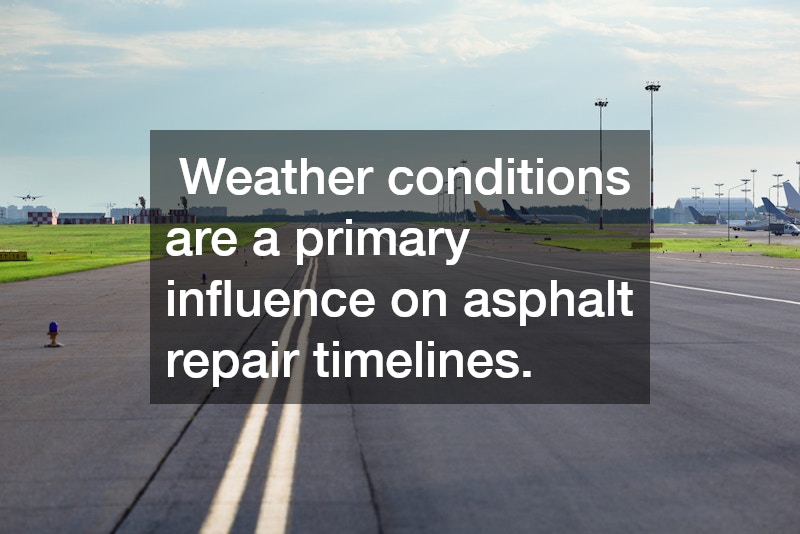
What to Expect During Professional Asphalt Repairs
Introduction
This article aims to provide insight into the process of professional asphalt repairs. Many property owners are curious about what these repairs entail, how much they cost, and how they will affect daily activities. We will cover common questions and key aspects of professional asphalt repair to help set accurate expectations.
How Long Do Professional Asphalt Repairs Take?
The duration of professional asphalt repairs can vary significantly depending on several factors. Generally, small repairs might be completed within a day, while larger, more complex projects can take several days to weeks.
Contractors aim to optimize both efficiency and quality, balancing these aspects to ensure long-lasting repairs.
Weather conditions play a significant role in determining the timeline for asphalt repairs. Rain or extreme weather can delay the curing process, extend project duration, and lead to uneven results if not carefully managed. Contractors usually plan for contingencies and schedule projects when the weather forecast is favorable.
In addition to weather, the size and complexity of the damage are critical variables. Extensive damage or multiple repair sites require more time for marking, cutting, and curing. Smaller, less complicated repairs, like filling small potholes, would naturally take less time. Understanding these factors can help property owners plan accordingly.
Factors That Influence Repair Time
Weather conditions are a primary influence on asphalt repair timelines. It’s crucial for the ground to be dry and relatively warm for optimal repair. Cold or wet conditions can delay the setting of materials and extend the repair time.
The type of asphalt used also influences repair duration. Some types set more quickly than others, so contractors choose materials based on specific timelines and durability requirements. Property owners can consult with contractors to select the most suitable options.
The extent of damage is another determining factor. More severe or widespread damage necessitates in-depth repairs and preparation, which extends the timeline. Routine inspections can help identify issues early, potentially shortening repair durations.
Stages of the Repair Process
The first stage in professional asphalt repair is preparation, which involves marking out areas needing repair and assessing the extent of damage. This preliminary step includes cleaning, ensuring the surface is free of debris and dirt, allowing new asphalt to adhere properly.
Next, contractors cut and remove the damaged asphalt layers, prepping the area for the new application. This stage might involve milling, which grinds down the old surface, or full-depth removal, dependent on the damage’s severity.
Finally, new asphalt is laid and compacted. Proper compaction ensures the surface’s durability and smoothness. The curing time varies based on the type of asphalt and weather conditions, with most surfaces ready for use within a couple of days.
How Much Do Asphalt Repairs Cost?
The cost of asphalt repairs can vary based on several factors, including the size and complexity of the job. On average, basic repairs such as patching potholes might range from a few hundred dollars, while larger projects like resurfacing an entire driveway or parking lot can cost several thousand dollars.
Labor costs form a significant portion of the total expenses for asphalt repairs. Skilled labor is essential for ensuring high-quality outcomes, and contractors typically factor in these costs when preparing their estimates.
Material costs vary depending on the type of asphalt mixture used. Different projects may require unique blends to meet specific needs, such as enhanced durability or climate adaptability, impacting overall expenses.
Factors Affecting Cost
The condition of existing asphalt significantly impacts repair costs. Well-maintained surfaces with minimal damage reduce the scope of work required, leading to lower expenses. Conversely, neglected surfaces may necessitate more intensive repairs and increased costs.
The repair method chosen also affects cost. Simple patching is less expensive than full resurfacing or reconstruction, with prices reflecting the complexity and time involved in each method.
Geographic location influences pricing, as labor and material costs can differ significantly depending on the region. Property owners in metropolitan areas might face higher costs due to higher demand and overhead.
Estimating Your Project Cost
To obtain accurate cost estimates, it is advisable to solicit multiple quotes from reputable contractors. This comparison helps property owners evaluate fair pricing based on the scope of work required for their specific project.
Understanding quotes is crucial, with each component itemized, including labor, materials, and any additional fees. A transparent quote allows for better financial planning and decision-making regarding the repair project.
Hiring experienced contractors can also help ensure that cost estimates are accurate. Reputable service providers are more likely to evaluate the site comprehensively, anticipating potential issues that might affect the total expense.
What Disruptions Can You Expect During the Repair Process?
During asphalt repair projects, property owners can anticipate certain disruptions to their daily operations. It’s important to be prepared for these interruptions and plan accordingly to minimize their impact.
Noise is a common disturbance during repairs. The machinery used for cutting, milling, and compacting can be quite loud, affecting not only the immediate premises but also neighboring areas.
Dust and debris are also potential inconveniences. Professional contractors typically take steps to control these factors, such as using water to dampen dust and cleaning up thoroughly after completing repairs.
Common Disruptions
Besides noise and dust, access restrictions during repairs are common, affecting driveways, parking lots, or roadways. Temporary closures ensure safety but can disrupt normal activities.
Limited access might require scheduling adjustments for deliveries, employees, or customers. Contractors often recommend a phased approach to keep parts of the area usable during repair work.
Professional contractors often coordinate closely with property owners, establishing timelines and access routes to minimize these disruptions, allowing for an overall smoother repair experience.
Minimizing Impact on Daily Activities
Effective communication with the repair team is key to minimizing disruptions. Contractors should provide clear timelines and updates, helping property owners to plan their daily activities better.
Strategic scheduling, such as conducting repairs outside of peak business hours or during weekends, is another strategy to reduce impact. By choosing optimal repair times, disruptions to routine operations can be minimized.
Being proactive about potential inconveniences and discussing concerns with the repair team can lead to customized solutions, ensuring a more streamlined process with minimal disruptions to daily life.
Conclusion
In summary, professional asphalt repairs involve various stages, costs, and potential disruptions. Being informed about what to expect can help in planning and managing the repair project effectively, ensuring a more streamlined experience.
Understanding the timelines, cost factors, and potential challenges allows property owners to make informed decisions, select suitable repair methods, and choose the right contractors for their needs.
Ultimately, well-planned asphalt repairs enhance property value and functionality, delivering long-term benefits with minimal disruptions to current operations.



